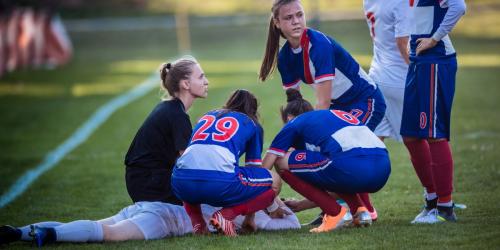The University of Calgary’s Integrated Concussion Research Program has recently released exciting research that has led to the development of a tool that will allow doctors “to accurately and rapidly measure proteins and small molecules known to indicate an injury that is present in the brain.” This tool is set for clinical trials, with the goal that the device will be able to detect brain injuries hours after the trauma occurred.
While this research can potentially revolutionize treatment for those with brain injuries, I wanted to explain to those seeking compensation for concussion injuries that there has been a “trickle-down” effect. Now damages are frequently sought for concussions caused by playing sports at even the most basic levels, reaching down to our young children playing sports in our schools and communities.
What is a Concussion?
First things first, however – what exactly is a concussion? A concussion is caused by impact forces to the brain, or by “impulsive forces,” where, for example, the chest hits something and the head snaps forward, causing trauma to the brain.
A minor concussion can resolve relatively quickly, but in some cases, the injuries compound into “post-concussion syndrome,” which may not resolve for weeks, months or years following the brain trauma, and could be permanent.
Click for more information about concussion symptoms, treatment, and recovery.
What are the Symptoms of a Concussion?
Concussion symptoms can include:
- Headaches
- Dizziness
- Vomiting and nausea
- Inability to concentrate
- Impairment of memory
- Impairment of judgment
- Lack of motor coordination
- Difficulty balancing
- Blurred vision or double vision, light sensitivity or seeing bright lights
- Tinnitus, or ringing in the ears
- Seizures
- Changes in mood, including loss of interest in favourite activities
- Displays of inappropriate emotion
- Restlessness, lethargy or irritability
Damages for Youth Concussions
Concussion injuries can begin in youth sports, played either as part of the school curriculum or as part of a community organized activity. The courts are now receptive for the most part to awarding damages for such youth sports injuries, which is illustrated by the following British Columbia case involving a head injury suffered in during a field hockey game during a high school gym class. In this British Columbia case, the trial court granted significant damages, in excess of $1 million, for a mild concussion injury that developed into something significantly more debilitating.
The 13-year-old boy in this case, was an only child and his mother had died when he was young. As a result, his father was very protective of him including hovering nearby while he attended school. His father allowed the boy to be absent from school frequently, to such an extent that his teachers and principal became very concerned. To encourage the boy to participate in the school Phys Ed program, they suggested that he play field hockey, even though he had missed all of the other Phys Ed classes where instruction on how to play field hockey was provided. On the day that he agreed to participate, he was struck in the face, above the bridge of his nose, by a field hockey stick, while trying to tackle another player. Initially, he suffered a mild concussion and cuts and bruises to the bridge of his nose, forehead, and both eyes. Although a normal recovery was anticipated, unfortunately, he became much worse over time and developed a serious somatoform disorder, which means that his injuries did not have a physical cause, but were the result of psychological factors. He sued his teachers and the school and was successful on the basis that he had not been adequately prepared with instructional building blocks for how to play field hockey. At the time of the trial, he no longer went to school and spent most of his time in his room, either watching television or on his computer. He had no set schedule for sleeping or waking, difficulty getting around, and his father took care of him, making most of his meals.
Notwithstanding that the initial injury was a mild concussion, the trial court awarded damages in excess of $1 million to compensate him for the subsequent debilitating psychological disorder he developed. The appeal court reduced the damages but the award is still significant, coming close to $1 million.
This case illustrates that even a mild concussion suffered on the school grounds or in an organized community sport may be compensable by a damage award, and perhaps a significant damage award, if the concussion develops into something far more debilitating. And it shows that compensation for concussion injuries has trickled-down from the high profile professional sports awards to youth sports injuries suffered at school or in the community.
If your Child has Suffered a Concussion
If your child has suffered a concussion as result of a sports injury, or indeed by any other cause, such as a car or bike accident, please CONTACT US for a free consultation. Our friendly, helpful and knowledgeable lawyers will listen to your story and help you assess your options.
Please note: This post was originally published in August 2017 and has since been updated to include recent events.

